
ICC chapters are cultivating tomorrow’s workforce
Building safety professionals serve an essential function in our society by helping to keep us safe and secure in our homes, schools, offices and throughout our communities. Right now, building safety jobs are available nationwide and over the next 15 years, the building safety industry is poised to explode with opportunity for young professionals. As seasoned industry veterans prepare to retire from the building safety industry, countless jobs are set to open up for a new generation of building inspectors and construction professionals.
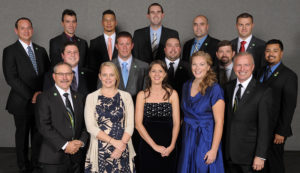
Every community needs building safety officials to administer safe building regulations and for young professionals looking to enter the workforce directly out of high school, or for members of the military transitioning to back civilian life, building safety can be a great career choice.
That’s why, in 2015, the International Code Council launched Safety 2.0, the signature initiative to fill the ranks with a new generation of building and fire safety officials, plans examiners, inspectors, architects and designers, and administrators. So far, more than 12,000 people have participated in Safety 2.0 training, mentoring, certification and career advancement programs.
However, there is no “one-size-fits-all” solution to cultivating tomorrow’s workforce. Code Council regions and chapters have been busy rolling out their own recruitment programs tailored to the unique needs, opportunities and challenges they face. Find out what works — and what to avoid.
Shadowing leaders exposes young professionals to opportunity
One of the most effective methods that chapters have found for giving young professionals a career boost is for them to shadow chapter leaders as they attend the ICC Annual Conference and code development hearings.
Last year, Jim Brown, deputy building official for the city of Gillette, Wyo., and an Code Council board member, launched the nation’s first regional shadow program, dubbed Safety 2.R, which offers a $2,000 scholarship to ICC Region II mentees that allows them to shadow the region’s president at the ICC Annual Conference. The program was an extension of a mentorship program established by ICC Region II Immediate Past President Jim Sayers in 2016.
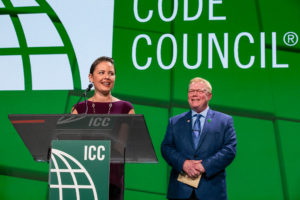
Jessica Iverson of Billings, Mont., was the first scholarship winner in 2018. Following her attendance at the 2018 ICC Annual Conference in Richmond, Va., Iverson became vice president of the ICC Montana Chapter and will also shadow Brown at the 2019 ICC Annual Conference in Las Vegas. Region II President Jack E. Applegate said that the chapter is actively pursuing corporate sponsorships that he hopes will allow them to offer up to five scholarships in the near future. In addition to the scholarship, Region II also offers opportunities to shadow each of the chapter’s 18 board members.
“The results [of the board shadowing program] have been beyond our wildest expectations,” Brown said. “Well over 90 percent of the shadows have moved into leadership positions within their community and state.”
“One of the biggest lessons we learned is that in order to help out the mentees and provide them with the best opportunities, you have to stay in touch and monitor their progress,” explained Applegate. “It takes a lot of time and guidance, but when you don’t do that, you tend to lose the person.”
Sometimes, young professionals who gain leadership experience through shadowing pay it forward by launching mentorship programs in their own chapters. Jason Pryor, a building inspector for the city of Gulfport, Miss., was so inspired by his shadowing experience at the 2017 ICC Annual Conference that he decided to spearhead a mentorship program for the Building Officials Association of Mississippi, of which he is the board director and chair of the Emerging Leaders Committee.
“It was just so inspiring to me,” Pryor said of his shadowing experience at the ICC Annual Conference. “I brag on that every opportunity I get.”
Pryor said his youth can be both an advantage and a hindrance. On the one hand, it gives him the energy to pursue his goal of launching a statewide high school mentorship program. On the other hand, it is proving difficult to change old habits.
“In the building code profession, 40 is still young,” Pryor noted. “Things are changing and we’re trying real hard to take that next step forward like the rest of the folks out there. The challenge is getting people to take the initiative to participate. That’s the $2 billion question in this industry.”
Using internships to open the door
Internships are another successful way to recruit new talent for leadership positions. Internships give people direct, hands-on experience that helps them learn how to spot challenges and opportunities. The Building Officials Association of Florida (BOAF) launched its internship program in 2017 as a way to address the state’s skilled labor shortage. In a state where construction contributes over $41 billion to the economy, such a shortfall was no small matter.
 The BOAF internship program provides an alternative path to certification that allows participants to bypass the state’s strict requirements for five years of education and on-the-job experience in order to become code officials. Candidates must first pass one of the eight Code Council exams in the desired inspector or plan examiner category, after which they work with a building official for four years under a provisional license from the state’s Building Code Administrators and Inspectors Board. During their internship, trainees must also pass a training course and a state exam in order to complete the program with a full code administrator and inspector license.
The BOAF internship program provides an alternative path to certification that allows participants to bypass the state’s strict requirements for five years of education and on-the-job experience in order to become code officials. Candidates must first pass one of the eight Code Council exams in the desired inspector or plan examiner category, after which they work with a building official for four years under a provisional license from the state’s Building Code Administrators and Inspectors Board. During their internship, trainees must also pass a training course and a state exam in order to complete the program with a full code administrator and inspector license.
Sergio Ascunce, a former member of the Code Council’s Building Membership Council from Key Biscayne, said that so far 21 municipal departments have adopted the internship program throughout the state, offering 90 training programs in the various categories, along with three approved private code training providers that offer 16 courses. “We believe the program has a huge potential and can serve as a model in other states challenged with a shortage in qualifying inspectors or a formalized process for training,” Ascunce said. “We are just scratching the surface of the potential for the internship program in Florida.”
Last year, the Building Officials Association of Texas (BOAT) launched a similar internship program in conjunction with a statewide career day for students. The program offers hands-on code training and exposes students to building code plan review and inspection practices that they would not otherwise get in school. Interns accepted into the program are paired with code professionals who act as mentors. Around 40 students have participated in BOAT’s Career Day conferences, and at one youth career event last year BOAT representatives talked with over 1,200 students about career pathways as a code official.
According to Van Tran of Bureau Veritas, an international certification organization, so far two young professionals have completed the internship program through his organization and found full-time work in the code industry. Another trainee interned in the building inspection department of the City of Plano. “It was a great channel to expose the students to this industry,” Tran said.
Selso Mata, chief building official for the city of Plano, who as BOAT president led the development of the internship program, pointed to some sobering statistics as the motivation for creating the program. Most code officials came to the job after pursuing careers in other fields, and with an average of 20 to 35 years of experience in code inspection, they are already close to retirement. “We want to let potential candidates know that there is an opportunity for them to make a career out of this as an inspector, plans examiner, permit technician or a building code official,” Mata said. “The public, in general, are unaware of what we do, so we also have a chance to tell our story.”
Passing the baton
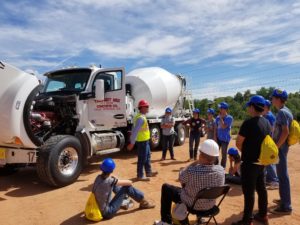 For chapters that don’t have the resources to launch and maintain internship programs but that can call on experienced code officials to share their knowledge with younger professionals, mentorships may be an effective way to recruit the next generation. That’s what the Colorado Chapter of ICC’s Building Futures Committee was created to do.
For chapters that don’t have the resources to launch and maintain internship programs but that can call on experienced code officials to share their knowledge with younger professionals, mentorships may be an effective way to recruit the next generation. That’s what the Colorado Chapter of ICC’s Building Futures Committee was created to do.
The chapter has been instrumental in rolling out the Code Council’s High School Technical Training Program across the state, providing schools with training materials and helping them adapt code curricula to their needs. The committee also provides high schools with funds, gets local construction companies to donate tools to the programs and supports schools that participate in architecture competitions.
Mentors guide students through the Code Council certification process, helping them study for tests and answering career questions. Students with technical questions can refer them to the committee’s group of technical advisors who have been assembled for just those types of concerns.
Hope Medina, the chapter’s chair of the mentorship program, said that high schools are becoming more interested in programs like it as they increasingly recognize the benefits of college alternatives for many students. Currently, 13 students have been paired with a mentor and one student has already earned their certification. “I think that individual high schools are trying to figure out how can they bring this back,” Medina said. “Vocational training was prevalent 20 years ago, but now there aren’t a whole lot of construction programs out there. But there’s been an uptick over the last five years.”
Medina said that ensuring that mentors and students stay in touch regularly — through face-to-face meetings and emails, for example — is vital for success, as is making sure that participants can communicate across the age gap. “Some people are in their 20s, and some are in their 50s,” Medina said. “The language isn’t always the same and you have to keep that in mind when you’re pairing them with a mentor.”
The mentorship program of the New Hampshire Building Officials Association (NHBOA) traces its roots to 2014, when chapter board members Bruce Buttrick and Tedd Evens launched an educational program for both experienced code officials and novices looking to improve their credentials. In the NHBOA program, mentors offer classes that introduce trainees to codes and the state’s construction laws, teach them how to read construction documents and review plans, understand the legal aspects of code enforcement, and learn the skills needed by building inspectors.
Chapter President William McKinney said that the program had 10 or 12 students its first year, including code officials, contractors looking to change professions and even architecture students. Two of the graduates are women, McKinney pointed out with pride, and have gone on to professional careers — one as a code official, and the other as an assistant plans examiner. “We give you the foundation that you would need to actually get employed as an inspector,” McKinney explained.
McKinney said that enrollment has risen and fallen over the years, but last year the program paired 10 students with mentors. Interest has waxed and waned along with staff turnover at the New Hampshire Technical Institute, NHBOA’s partner in the mentorship program. However, NHBOA is looking at revamping and expanding the curriculum using the Code Council’s Safety 2.0 High School Technical Training Program and College Technical Training Program.
McKinney said that the building community sees the value of the NHBOA mentorship program, as well as instructors in the state’s vocational technical programs, but they are still having trouble convincing those who develop the state’s high school curricula. “I’m not sure if the state’s curriculum development people ‘get it’ right now, but they will,” McKinney said. “It’s our job to sell it to them.”
To convince others that code enforcement and administration is a worthwhile profession, McKinney argues, people who are in the profession already need to believe it themselves. “We need to look at [code enforcement and administration] as a profession and not as a retirement plan,” he explained.
Teaching old dogs new tricks
Some chapters are having success focusing their recruiting efforts on mid-career professionals in other construction-related fields, and even people from other professions entirely, who are looking for new career challenges and opportunities.
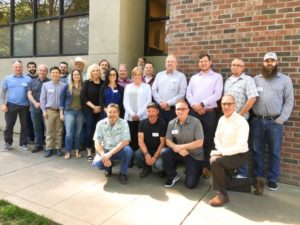
In 2012, the California Building Officials (CALBO) launched the Building Officials Leadership Academy (BOLA), an intensive training program that provides executive-level courses in establishing and running a successful building department. Seven graduating classes and over 100 graduates later, BOLA is still going strong. To date, 43 graduates have gone on to serve as building officials or in managerial positions, said CALBO President Sharon Goei, P.E., CBO.
Goei explained that the core of BOLA consists of five days of classes in budgeting and finance, legislative advocacy, effective communications, and critical thinking skills. Throughout the rest of the year, students take additional elective classes during the three regularly scheduled Education Weeks (or four during code change years like this one). “The program was created to maximize the leadership capabilities of seasoned building safety professionals because at that time we were realizing that people were leaving and retiring, and new folks weren’t coming in,” she said. “It started out by training the folks who might be experienced plan checkers and plan inspectors to become supervisors and building officials.”
Due to California’s size, Goei said that the BOLA classes alternate between the state capital of Sacramento in the northern half of the state and the Code Council’s Brea office in the southern half. Students who take the Sacramento classes get to visit the California State Legislature and meet elected officials as part of an annual Advocacy Day. “Advocacy Day is a way for us to offer our profession as a resource,” she explained. “A lot of people in government don’t know what a building inspector does.”
The BOLA program has been so successful, in fact, that the Code Council recently awarded CALBO a $2,500 grant to help the program expand. Goei said that the program has also been a great success for graduates, who develop lifelong connections that can help them advance their careers further once they graduate. “They all keep in touch with each other,” she said. “They have formed a network. It’s been great to see.”
Tapping into the school pipeline
 Another rich vein of future code professionals that some chapters are exploring are high school students who are getting ready to graduate and are considering what career path to pursue. For the past four and a half years, the Virginia Building and Code Officials Association (VBCOA) has been reaching out to high schools across the Commonwealth of Virginia to educate administrators, teachers and students alike about the prospects of a career in code administration.
Another rich vein of future code professionals that some chapters are exploring are high school students who are getting ready to graduate and are considering what career path to pursue. For the past four and a half years, the Virginia Building and Code Officials Association (VBCOA) has been reaching out to high schools across the Commonwealth of Virginia to educate administrators, teachers and students alike about the prospects of a career in code administration.
Students in the high-school program receive training toward obtaining Code Council certificates in building, electrical, mechanical and plumbing inspection. Participating schools pay small per-school and per-student fees that cover copies of the current state code book and test preparation. Each school is free to design the courses in a way that best suits their needs.
“When these kids walk out of high school, whether or not they go on to college, they’re going to have those four certificates in their back pocket,” said VBCOA President Pete Mensinger, CBO, who co-chairs the committee overseeing the school program. “And they’re portable, valid in any state.” Mensinger said the program provides students with problem-solving skills that can be applied in any profession, not just in construction.
In just four and a half years, VBCOA’s high school training program has connected with 32 of Virginia’s 90 counties and enrolled 28 schools so far, Mensinger said. Over 500 certificates of achievement have been awarded so far.
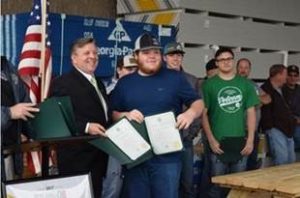 Keeping a program of that size running year-round is almost a full-time job for the all-volunteer committee that oversees the program. Committee members attend job fairs and Skills USA competitions to spread the word about the program.
Keeping a program of that size running year-round is almost a full-time job for the all-volunteer committee that oversees the program. Committee members attend job fairs and Skills USA competitions to spread the word about the program.
“Like a shepherd tending the sheep, you have to keep up with the schools,” Mensinger said. “You need to touch base with them at least three or four times a year or they fall by the wayside and don’t re-up. We’re already doing our day jobs, and it takes a lot of time and work outside the office to work on those communications.”
“This program does not succeed without garnering the support of others,” Mensinger said. “It really takes a devoted person to get involved with it.”
But all the hard work has paid off handsomely, with over 500 certificates being issued so far.
“In the four and a half years we’ve been involved in the program, Virginia is now number one in the union with the most kids enrolled in the program,” Mensinger said with pride.
Through shadowing, internships, mentoring programs, retraining and high school training programs, Code Council chapters are exploring creative ways to build on the Code Council’s Safety 2.0 initiative to attract the next generation of code professionals.







